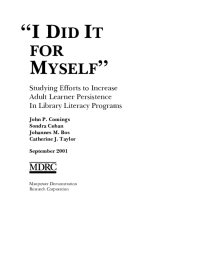"I Did It for Myself"
Studying Efforts to Increase Adult Learner Persistence in Library Literacy Programs
Learning to read and write is a serious challenge for adult students, many of whom enter literacy programs with low skills, special learning needs, or negative past experiences in school. Adult responsibilities make it especially challenging for these students to persist in a literacy program long enough to make meaningful progress toward reaching their literacy goals.
Launched in 1999 and funded by the Wallace-Reader's Digest Funds, the Literacy in Libraries Across America (LILAA) initiative is aimed at helping literacy programs at public libraries across the country implement strategies to improve persistence among adult students. These strategies aim to make program attendance easier by offering child care, transportation, and expanded hours of operation. Instructional priorities include making program instruction more engaging and relevant by adapting curricula (often designed for children) to adult interests and needs, improving teacher and tutor training, and identifying potential barriers to persistence at program entry.
As part of the LILAA initiative, in 2000 MDRC and the National Center for the Study of Adult Learning and Literacy (NCSALL) began a three-year study of the implementation and effectiveness of strategies to increase student persistence in the adult literacy programs of five public libraries: Redwood City Public Library and Oakland Public Library in California, New York Public Library and Queens Borough Public Library in New York City, and Greensboro Public Library in North Carolina. Researchers are (1) collecting and analyzing data on demographic characteristics, program retention, hours spent in literacy activities, and student goals; and (2) studying students' experiences in the programs by conducting extensive ethnographic interviews, observations of classes and tutoring sessions, and focus groups.
This report describes the design of the LILAA persistence study, the strategies that participating libraries are using to increase student persistence, and emerging implementation issues. It describes existing patterns in student persistence, identifies factors that support or inhibit persistence, and begins to explore the relationship between program strategies and persistence. Early emerging findings, to be tested in later analysis, suggest that three categories of themes and their related strategies are particularly important in explaining student persistence:
- Programmatic. The programs in this study are able to provide individualized attention to students because they have stable leadership, access to technology, solid financial support, and relatively small student populations. Differences among the literacy programs do emerge, however, in terms of their integration into the larger library organization, which can affect program strategies.
- Instructional. The programs in this study try to be innovative in tailoring instructional methods to students' needs while maintaining an assessment system that allows them to measure learning gains. Relevant, high-quality instruction, appropriate to the reading level of students, is important.
- Student-based. Because the programs must address the needs of highly diverse students, they seek to develop strategies that can accommodate students' cultural and personal identities, goals, and learning disabilities as well as the interests of those who encouraged them to enter the program.
Further lessons about the implementation and impacts of persistence strategies in library literacy programs will emerge over the next two years - through reports on program implementation, levels of student persistence, and the relationship between persistence and literacy test scores - and will culminate in recommendations for program design and policy.






